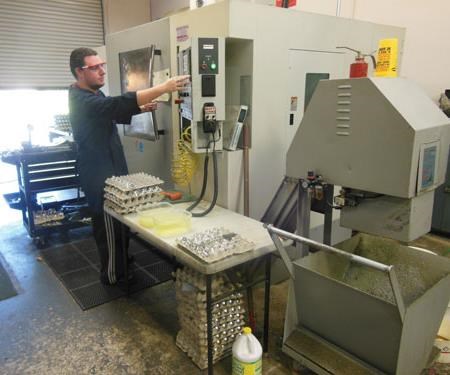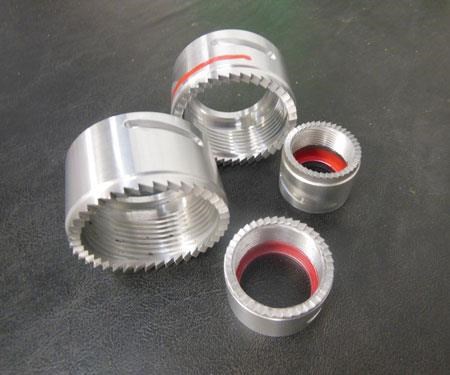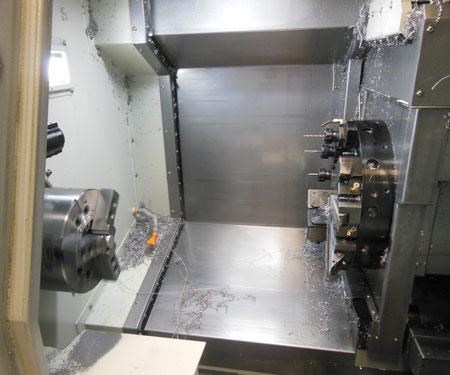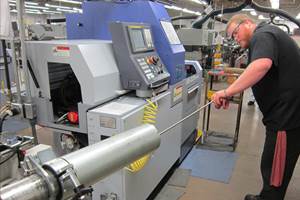Loyalty Bolsters Shop’s Growth
This shop has found its groove with four Ganesh CNC machines that have proven to deliver the performance and quality the company and its customers expect.
If it ain’t broke, don’t fix it. When applied to processes, this long standing strategy can be very effective in ensuring consistency and providing expected results. While an argument can be made on the shop floor for trying to find better ways by testing the waters with other equipment brands, many shops feel more comfortable sticking with what they know.
Lion Heart Manufacturing, a small shop in Simi Valley, California, has found its groove with four Ganesh CNC machines that have proven to deliver the performance and quality the company and its customers expect. As the company grows, management plans to stay the course with this brand of machine, confident that the positive results will continue.
Relationship Building
Paul Taylor, operations manager at Lion Heart, has been in manufacturing for almost 40 years. After serving an apprenticeship in England in 1976, he came to the United States and continued his work with several other companies. In 2010, he and his wife, Lion Heart Owner Karen Taylor, put everything they had into starting their company.
Opening a machine shop in the struggling economy of that time was not easy. Bank financing was not readily available, so the Taylors were fortunate to find another practical option. A sales rep who Mr. Taylor has worked with through the years introduced him to Ganesh machines, which offered the performance capabilities, as well as the price range, that the Taylors were seeking. Equally important, Ganesh was able to provide financing that allowed Lion Heart to place two machines on the floor and start making parts.
The company first brought in a VMC-4020 four-axis CNC mill and a KSL-7612 TMY with a 10-inch chuck, 3-inch bar capacity and full Y and C axes. Beyond helping to get Lion Heart off the ground by assisting with the purchase of the machines, Ganesh has continued to provide the support and service the company is looking for.
Mr. Taylor says he has pushed the limits of the machines more than a few times, and they have held up to the test. “While I’ve been in the business for a long time, I hadn’t done machining for 20 years,” he says. “So when we got the first couple of machines, I crashed them pretty hard at first. Ganesh came over and set them back up, and we haven’t had any problems.”
The machine tool supplier has continued to be efficient and effective with service. For each service call Lion Heart has had in the 5 years it has been in business, support has been to the shop in the same day and had the machines running within hours. The relationship between the companies has grown to where the Taylors view Ganesh more as a partner than a supplier.
The company has since added a KSL-5210T turning center and a KSL-5212 TMY turn-mill machine. The current plan is to pay these machines off and then add four more, but business has been strong to the point that the Taylors have had to turn business away, so a move may come sooner rather than later.
Industry Focus
Lion Heart produces almost exclusively airplane parts. The company’s primary material is aluminum, but it also works in titanium and 15-5 PH and 303 stainless, depending on the parts. Almost 90 percent of its business is devoted to a single customer. While putting so many eggs in one basket can be risky, Mr. Taylor feels a similar loyalty between his company and this customer. He says this large, secure company sends as much work their way as they want, so as long as he can provide the necessary quality, the relationship will remain strong.
But to distribute the workload a little further, Mr. Taylor intends to pick up new customers as the company adds new machines. He does intend to stay in the aerospace realm, though. The company is AS9100 certified. He says maintaining that quality standard in the shop requires additional expenses that don’t go away if he happens to pick up some work outside of aerospace. Therefore, his prices for such parts may be higher than the next company’s. Aerospace parts fit Lion Heart’s niche well because the company already has the infrastructure to run them.
Seeking Efficiency
Besides the Taylors, three other employees keep the business running through two shifts. Mr. Taylor handles the programming, machine setups and inspection. The operators tend two or sometimes three machines at a time, depending on part runs, which can be anywhere from 15 to 400 pieces with cycle times averaging between 4 and 5 minutes, but sometimes being as long as 10 minutes.
Many of the company’s jobs are on yearly purchase orders requesting a specific number of parts per month. Because he’s confident that the following month’s parts will be shipped, Mr. Taylor does not hesitate to save setup time by producing more than a single month’s parts in a run and sitting on the inventory until it is needed. Mr. Taylor is a Six Sigma Black Belt and knows the proven strategies for lean manufacturing and minimizing excess, but he says in his small shop, such rules are not always effective.
He finds other ways to improve production efficiency. In two of the machines, five tool positions are always the same. Almost every job uses the first three, and the next two are used on 60 percent of the work. This strategy saves time both in tool changes and programming, since he always knows exactly where certain tools will be. These two machines run many of the same parts and part families, so he gets parallel results from the same tooling and programs.
Consistency in many operations correlates well with the consistency in service that Lion Heart feels it receives from Ganesh and its machines. “I came from a background of high-end machines,” Mr. Taylor says. “We’ve been impressed with the performance of the Ganesh machines and their rigidity. Considering how well they’ve performed and the support we get from the company, we have no reason to look anywhere else for machines as we grow.”
Related Content
6 Tips for Training on a Swiss-Type Lathe
There are nuances to training a person to effectively operate a Swiss-type lathe. A shop I visited a while back offers some suggestions.
Read MoreLaser Technology "Turns" into a Turning Tool
This new technology uses a laser to act as a cutting tool to "turn" parts from solid barstock. This high-speed precision turning machine is especially useful for micromachining, enabling high accuracy for small, complex parts that are often delicate and difficult to machine when implementing conventional turning processes.
Read MoreWhen a CNC Turn-Mill Doesn’t Turn
A shop in Big Sky Country uses a B-axis multitasking machine to produce complex, prismatic medical parts that require no turning complete from barstock.
Read MoreAutomation Breakthroughs Revolutionize Precision Machining for Complex Parts
Marubeni Citizen-Cincom delivers custom solutions to address some of the biggest challenges in precision machining from handling small parts, to robot integration and unique tooling needs.
Read MoreRead Next
A Shop's Trial by Fire
Willis CNC turned a potential disaster into a positive experience. By finding machines that suit the company’s jobs and its operators well, the staff worked through the fire’s ashes without losing any customers, and the experience strengthened the company.
Read MoreA Tooling Workshop Worth a Visit
Marubeni Citizen-Cincom’s tooling and accessory workshop offers a chance to learn more about ancillary devices that can boost machining efficiency and capability.
Read MoreEmerging Leaders Nominations Now Open
Here’s your chance to highlight a young person in your manufacturing business who is on the path to be a future leader moving your company forward.
Read More












.jpg;maxWidth=300;quality=90)
.jpg;maxWidth=300;quality=90)












